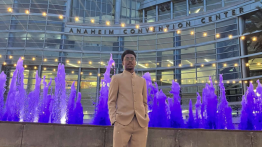Electrical Engineering Student Spotlight: Zephaniah Christopher Odidika
POSTED ON: November 8, 2022

Image of Zephaniah Christopher Odidika EE’25.
We interviewed Zephaniah Christopher Odidika, a second-year electrical engineering student at the Albert Nerken School of Engineering. Read on to learn about him and his studies.
What were your favorite subjects growing up in middle and high school?
I was an average and balanced student, so I did not really have a favorite subject. Unbelievably, math was not my strongest subject growing up. My sophomore high school teacher made me fall in love with Algebra II and I went on to enjoy math, to an extent. She taught me that I can look at math in a different way. I figured out that there are diverse ways to approach a question to end up with the same solution.
Who was your biggest influence in your middle/high school years?
I went to an early collegiate high school, which means I graduated with my associates degree and high school diploma. My first-year English teacher was a great teacher, and an even better person, but the hardest grader in the world. What made it more difficult is that because she knew me outside of class, she would grade me harder to push me to do better. She really helped me through challenging times in high school, especially when I started my college classes. She was my go-to for essays, and I could see my writing skills get better over time.
Why did you choose to study electrical engineering in college?
My parents gave me three options: lawyer, engineer, or doctor. I did not enjoy my biology class, so that narrowed my choices to lawyer or engineer. The summer of 2019, I attended Cooper Union’s Summer STEM Program taught by Neveen Shlayan, associate professor of electrical engineering. The final project was to build a pitch theremin, a musical instrument controlled by the distance your hand is from the copper rod. Going from 0 to 100 in six weeks really solidified my decision in engineering and I knew for sure that I wanted to be an electrical engineer. After NYC, I knew I wanted to be an engineer and I started to repair cell phones on the side. I am still open to becoming a patent lawyer in the future.
What has your favorite class been so far?
The first-year engineering design class, EID101, was a fun class. The class starts students off with hands-on projects. Students produce a final project within a specific class. I did neuroscience with Dr. Elizabeth Waters, director, STEM Outreach, and while the class itself was not electrical engineering geared, it really taught me important engineering principles such as teamwork, communication, presentation skills, how to take feedback, engineering processes, and most importantly, consulting others.
What do you hope to do with your degree when you graduate?
I would like to go into the renewable energy sector, specifically solar energy. As a first-generation American, I would like to help those in Nigeria, especially my family, who do not have the funds for electricity.
What has been the hardest obstacle to overcome in college as an engineer? How did you overcome the challenge?
The transition from high school to university is difficult in and of itself, especially an academically rigorous university like Cooper Union. Personally, not comparing myself to others who may appear smarter than me is something I had to learn. University is the place to meet people from different walks of life and take advantage of that by learning from them, and possibly teaching others what you know is very special.
What advice do you have for kids today who want to get into engineering?
People always say, “love what you do.” You must really love engineering to pursue a degree in engineering because it will break you. I would suggest to do your due diligence: research types of engineering and if you find an area that you think you like, attack it. YouTube is free. Watch an MIT Open Course lecture for an introduction of a topic to see if it is interesting. Also, have an open mind. Engineering is very difficult, and one must have very thick skin, but being challenged is part of life and engineering is all about solving problems that have not yet been answered. The Cooper Union challenges its students, but at the end of the day, Cooper teaches its engineers to look at a problem from all areas, not just at face value.




